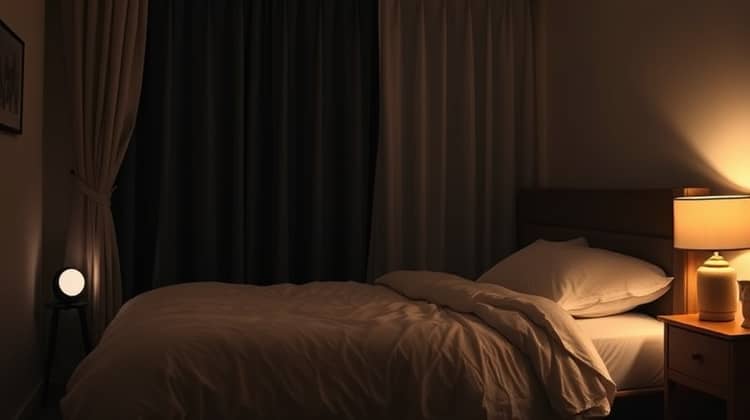Sleep is a vital aspect of our overall health and well-being. However, many people struggle to achieve a restful night’s sleep due to various factors such as stress, lifestyle choices, and environmental influences. Fortunately, improving your sleep quality isn't as complicated as it may seem. With a few adjustments to your habits and surroundings, you can enjoy deeper, more restorative sleep.
Understanding the importance of sleep is the first step in making necessary changes. Quality sleep contributes to better physical and mental health, enhances cognitive function, and supports emotional balance. By prioritizing sleep and implementing effective strategies, you can prevent sleep deprivation and its negative impacts.
In this article, we will explore ten practical methods to help you get better sleep at night. From setting a consistent schedule to creating a calming bedtime routine, these tips aim to improve the overall quality of your sleep.
1. Set a Consistent Sleep Schedule

Establishing a regular sleep routine is crucial for improving sleep quality. Our bodies have internal clocks, known as circadian rhythms, that must be aligned with our sleep patterns for optimal rest. When we go to bed and wake up at the same time every day, we signal our body to prepare for sleep and wakefulness appropriately.
Inconsistent sleep schedules can disrupt the natural rhythm, leading to difficulties falling asleep or waking up feeling groggy. Making a conscious effort to stick to a consistent schedule helps to regulate your internal clock and can significantly enhance your overall sleep quality.
Try to go to bed and wake up at the same time every day, even on weekends. This practice promotes a healthier sleep cycle and minimizes the risk of sleep disorders.
- Aim for 7-9 hours of sleep each night
- Go to bed and wake up at the same time every day
- Avoid sleeping in on weekends
2. Create a Relaxing Bedtime Routine

A calming bedtime routine allows your mind and body to unwind from the day's stresses. Engaging in relaxing activities before bed signals to your brain that it’s time to rest. This transition period is essential for preparing for sleep and can make a significant difference in how quickly you fall asleep.
Consider incorporating soothing activities such as reading, gentle stretches, or taking a warm bath into your routine. Establishing a consistent pre-sleep routine can also enhance your sleep quality by promoting relaxation and reducing anxiety.
- Set aside 30 minutes to 1 hour for relaxation before bed
- Start with calming activities like reading or meditation
- Gradually prepare your body for sleep with dim lighting and comfortable surroundings
3. Optimize Your Sleep Environment

Creating a sleep-friendly environment can greatly enhance your sleep quality. A comfortable bedroom with the right temperature, light, and noise levels can facilitate restful sleep. Aim for a cool, dark, and quiet space that promotes relaxation and tranquility.
Consider investing in high-quality bedding, blackout curtains, and a white noise machine to improve your sleep environment. A well-curated space can reduce distractions and help you drift off more easily at night.
- Make sure your bedroom is dark and quiet
- Adjust the room temperature to a comfortable level
- Invest in a quality mattress and pillows
4. Limit Exposure to Light in the Evening

Exposure to artificial light, especially blue light from screens, can interfere with your body's ability to produce melatonin, the hormone responsible for regulating sleep. Reducing light exposure in the hours leading up to sleep can help your body prepare for rest.
Implement strategies to limit light exposure, such as dimming lights in your home and reducing screen time at least an hour before bed.
- Turn off electronic devices an hour before sleep
- Use dim lights during the evening hours
- Consider wearing blue light-blocking glasses if needed
5. Be Mindful of What You Eat and Drink

What you consume throughout the day can significantly impact your sleep quality at night. Certain foods and beverages can either promote good sleep or disrupt it. For instance, heavy meals, caffeine, and alcohol should be consumed with caution closer to bedtime, as they can interfere with sleep.
Instead, focus on incorporating sleep-promoting snacks if you need to eat closer to bedtime, such as bananas, oatmeal, or herbal tea. Understanding the relationship between diet and sleep can help you make better choices for your evening routine.
It's also beneficial to establish a meal schedule that allows your body enough time to digest before you recline for the night. This will ensure that discomfort or indigestion doesn’t keep you awake.
- Avoid large meals close to bedtime
- Limit caffeine intake in the afternoon and evening
- Incorporate foods rich in magnesium and tryptophan into your diet
Ultimately, being mindful of your diet can create a more conducive environment for sleep, enabling you to wake up refreshed and energized.
6. Get Regular Physical Activity

Engaging in regular exercise is beneficial for both physical health and sleep quality. Physical activity can help reduce stress and anxiety while also promoting deeper sleep. Aim for at least 30 minutes of moderate exercise a few times a week to reap the benefits.
However, timing is essential; exercising too close to bedtime may leave you feeling energized, making it more difficult to wind down for sleep. Find a time that works best for you, whether it's early in the morning, during lunch, or early evening.
- Aim for at least 30 minutes of moderate exercise most days
- Find a time that suits your schedule
- Avoid vigorous exercise close to bedtime
7. Manage Stress and Clear Your Mind

Stress and anxiety are common sleep disruptors. Finding effective ways to manage stress during the day can significantly improve your ability to relax at night. Incorporate practices such as mindfulness, meditation, or journaling to help calm your thoughts before bed.
Making a conscious effort to address stressors and clear your mind can help alleviate anxiety, setting the stage for a peaceful night's sleep.
- Practice mindfulness or meditation before bed
- Keep a journal to express your thoughts and feelings
- Create a to-do list for the next day to ease your mind
8. Limit Naps During the Day

While naps can be beneficial for recovery and alertness, excessive or poorly timed napping can interfere with nighttime sleep. If you find yourself napping frequently or for long periods, it may disrupt your ability to fall asleep at night.
Aim to limit naps to 20-30 minutes and avoid them late in the afternoon to mitigate their impact on your nighttime rest.
- Limit naps to 20-30 minutes
- Avoid napping late in the afternoon
- Try to maintain a consistent sleep schedule
9. Avoid Electronics Before Bed

The use of electronics before bedtime can interfere with your ability to fall asleep due to the stimulating content and blue light exposure. Establishing a tech-free zone in the hours leading up to bedtime can promote a more restful atmosphere.
Consider replacing screen time with calming activities such as reading or practicing relaxation exercises to help your mind wind down.
10. Seek Professional Help if Needed

If you've tried various strategies but still struggle with sleep issues, it may be time to seek professional help. Sleep disorders can have underlying medical causes that require attention, and a healthcare professional can help you identify and address those issues.
Don’t hesitate to consult a sleep specialist if your problems persist. They can provide guidance, conduct necessary sleep studies, and suggest appropriate interventions.
- Consult your primary care physician first
- Seek a referral to a sleep specialist if needed
- Consider sleep studies for persistent sleep issues
Conclusion

Prioritizing your sleep is essential for optimal health and well-being. With various factors influencing sleep quality, making a few lifestyle adjustments can significantly enhance your overall experience. From establishing a consistent schedule to optimizing your sleep environment, every small change can contribute to better sleep.
Remember that what works for one person may not work for another. Experiment with these tips to find the right combination that suits your needs. Over time, you can create a personalized sleep plan that fosters a restful night’s sleep and enhances your daily life.
Prioritizing and valuing sleep as an essential component of your wellness journey will lead to a happier, healthier you.














